Viva Mi Gente! 12 Latino Celebrities and Characters Who Thrust HIV/AIDS Into Popular Culture

Latinos often speak about themselves as if they are one big family: Viva mi gente! ("Long live my people!") If we truly are a family, then we need to be more open about speaking about sexual health and HIV/AIDS. Thankfully, many Latinos in our global family have already begun that conversation, using their celebrity status to fuel the message of HIV awareness. Though not all those featured here take the label "activist" (and those that are fictional characters, of course, never could), it's important to recognize prominent Latinos who refused to stay silent about HIV/AIDS in our communities.
Some of these Latinos choose to be active by sparking dialogue around HIV/AIDS. Some spread their message through writing, some through acting, some through openly living their lives. The fictional characters among them alerted fans in several genres to a Latino presence in the HIV epidemic. Through all their examples, one message is clear: If we want our family to thrive, then our family has to stay alive; and fighting HIV/AIDS -- which disproportionately affects Latinos -- needs to be high on our list of priorities.

Reinaldo Arenas
Reinaldo Arenas was a Cuban poet, novelist, playwright, and among Cuba's most famous writers and expatriates. Though an early supporter of Fidel Castro, once Arenas saw what was happening to Cuba's people, especially its LGBT population, he withdrew support and began to rebel, and eventually lived as an exile in the U.S. He was imprisoned in 1974 in Cuba for "ideological deviation" and for publishing abroad without official consent.
In his autobiography, Before Night Falls, Arenas recounted his sexually active lifestyle and claimed to have slept with more than 5,000 men. Though many of his friends dispute the number, they do not dispute his promiscuity. His autobiography was turned into a movie starring Javier Bardem as Arenas and directed by Julian Schnabel (The Diving Bell and the Butterfly).
Diagnosed with AIDS in 1987, Arenas committed suicide in 1990 in New York. In his suicide letter, he wrote: "Due to my delicate state of health and to the terrible depression it causes me not to be able to continue and struggling for the freedom of Cuba, I am ending my life ... I want to encourage the Cuban people out of the country as well as on the Island to continue fighting for freedom ... Cuba will be free. I already am." Even in his last words, his life and his fate were seen as intimately tied to his homeland.

Rosie Perez
Rosie Perez is a Puerto Rican-American Academy Award- and Emmy-nominated actress, choreographer, dancer, director and activist. She grew up in the Bushwick area of Brooklyn. She started her career in the late 1980s as a dancer and choreographer for the music videos of Janet Jackson, Bobby Brown, Diana Ross and LL Cool J. She also choreographed the Fly Girls (including a pre-fame Jennifer Lopez) on the Fox TV comedy show In Living Color, for which she received multiple Emmy nominations. She was discovered by Spike Lee in a dance club, and he cast her in an acting role in Do the Right Thing in 1988, and five years later, in 1993, she received an Oscar nomination for the movie Fearless.
Perez is an outspoken HIV activist, as well. She starred in and directed the Spanish-language AIDS PSA campaign "Join the Fight" for Cable Positive, which featured the actors Wilmer Valderrama, Erick Elias, Lorena Rojas and Miss Universe Zuleyka Rivera. President Barack Obama appointed Perez to the Presidential Advisory Council on HIV/AIDS (PACHA), and she was sworn in on Feb. 2, 2010. She moderated chats around World AIDS Day at the White House and often tweets advocacy messages from her Twitter account @rosieperezbklyn.

Wilson Cruz
For those growing up gay in the '90s, Wilson Cruz represents a monumental point of visibility -- he played one of the first openly gay characters on television, Enrique "Rickie" Vasquez from My So-Called Life, who dealt with coming out, being thrown out of his house and being abused. Of Afro-Puerto Rican ancestry, Cruz works with and advocates on behalf of LGBT youth, especially youth of color.
His other most notable role is on LOGO's Noah's Arc, where he played Junito Vargas, the love interest of main character Ricky Davis, the "promiscuous friend" in the portrayed group of four gay African-American friends in L.A. On the show, Junito is a doctor who is openly HIV positive. He also portrayed openly HIV-positive Angel Dumott Schunard in Broadway's Rent.
Late activist and TheBody.com blogger Brandon Lacy Campos even recounted in a blog an instance where Wilson Cruz stood up for him at a nightclub when a potential suitor refused to court Brandon after he disclosed his HIV-positive status.
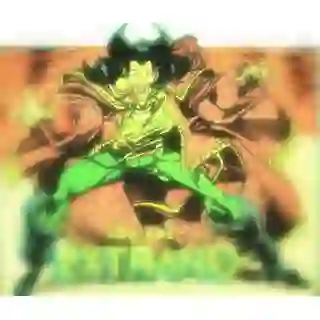
Extraño/Gregorio de la Vega
Looking down the (short) list of gay superheroes, you will see a lot of names of Caucasian characters -- and many of them did not come out until the '90s, 2000s, or 2010s. However, DC Comics did have a (horribly stereotyped) gay Latino superhero in the 1980s, and his name was Extraño -- which literally means "strange." Extraño (whose real name is Gregorio de la Vega) is a master sorcerer from Peru who when introduced was an effeminate man who wore loose, colorful clothing and was lively and jovial. He usually referred to himself as "Auntie," and often acted as a parent-like figure to other people on his superhero team -- The New Guardians, a group selected by the Guardians of the Universe to take part in an experiment on human evolution.
Here's where things do get a little "strange": Extraño was not handled well by DC, and many have since tried to talk about his history. People have tried to explain what happened to him, and some gay geeks have tried to resurrect his legacy. Extraño never came out, but he utilized a lot of slang terms, spoke in over-the-top sexual innuendo, and embodied a lot of other stereotypes. It was later revealed that Extraño was HIV positive, after being attacked by an "AIDS vampire" that was called ... wait for it ... "Hemo-Goblin." Though he came out as HIV positive, it was unclear whether he was previously positive or actually infected by the AIDS vampire. Even weirder, the storyline goes that Hemo-Goblin was created by a white supremacist group to eliminate anyone who was not white by infecting them with HIV.
Source: Comicvine.com
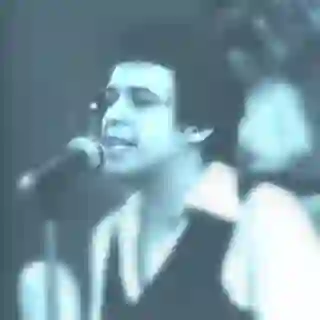
Héctor Lavoe
Héctor Lavoe was one of the most well-known Puerto Rican salsa singers. Lavoe is best known for the anthemic "El Cantante," a song that describes what it's like to be el cantante ("the singer") of all the songs, but people fail to recognize the pain behind the music while they're enjoying it.
Lavoe had a long bout with drug addiction, and in 1979 he even sought the help of a high priest of the santería faith to help his recovery. This is documented in the song "Aguanile." Though he briefly recovered, he relapsed following the deaths of his father, son and mother-in-law. After those deaths, and his diagnosis with HIV, Lavoe attempted suicide on June 26, 1988, by jumping off the ninth floor of the Regency Hotel Condado in Puerto Rico. He survived the fall, but his body never recovered. Lavoe died on June 29, 1993, from AIDS complications at a New York City hospital. Marc Anthony and Jennifer Lopez played Lavoe and his wife Puchi in the film El Cantante in 2007.

Rosario Dawson
Acclaimed actress and advocate Rosario Dawson is from New York City's Lower East Side and boasts Puerto Rican, Cuban, African American, Irish and Native American descent. Her film career began when she was cast off the street in the controversial 1995 indie film Kids. Dawson played libertine Ruby, a teenage girl with plenty of sexual experience who goes for an HIV test that comes back negative while her best friend, the more conservative Jenny (played by Chloë Sevigny), tests HIV positive.
Growing up, Dawson knew many people living with HIV/AIDS, most notably her mother's best friend, her "Uncle Frank." "I would share my food with Frank," Dawson recalls, "and he would just cry, 'My family and friends never do that with me, because they're afraid of being contaminated.' I was just 7 years old, and I knew I couldn't get AIDS that way." Dawson eventually ended up moving in with Frank and his partner Vincenzo.
Dawson had been working for HIV/AIDS awareness even before her work in the film adaptation of the Broadway musical Rent, in which she played Mimi Marquez, the heroine of the show, who is living with HIV. She has been involved with PSAs for Cable Positive, tweets about HIV on World AIDS Day, and is the spokesperson for Aldo Fights AIDS. Rosario is also involved with PFLAG's Stay Close organization, where she and Frank are co-spokespeople.
Source: Marie Claire
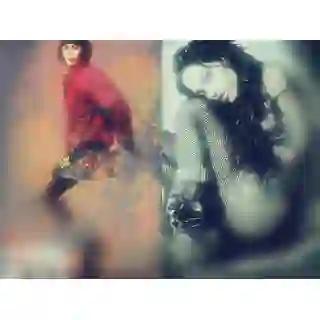
Angel Dumott Schunard and Mimi Marquez
Rent made history for several reasons. A musical about a group of people living in New York's Lower East Side in the days of bohemian Alphabet City against the backdrop of HIV/AIDS and poverty, it went on to win the Pulitzer Prize (a rarity for a musical). It also won the Tony Award for Best Musical, and Wilson Jermaine Heredia won a Tony for his performance as Angel Dumott Schunard, the HIV-positive Latina drag queen character.
The show features many HIV-positive characters, chief among them its two Latino characters -- Mimi Marquez and Angel Dumott Schunard. Angel's romance with the character Tom Collins begins when Angel finds him beaten on the street on Christmas Eve. Angel is often considered the heart and soul of the show -- he is the only character to die in the play, and his funeral serves as a major plot point for the characters.
Mimi Marquez is the lead female of the show. She is an exotic dancer at a club called the Cat Scratch. Mimi spends most of the show going in and out of a relationship with Roger Davis, who lives in her building and is also HIV positive. The ending of the show finds Mimi on the brink of death, but she ultimately does not succumb and is reunited with Roger. Mimi has been portrayed most notably by veteran actress Daphne Rubin-Vega and, in the film version, by Rosario Dawson.
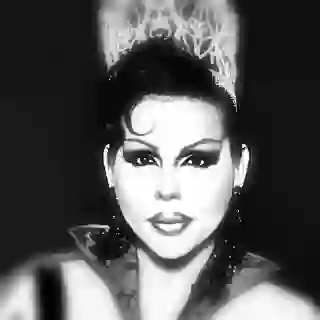
Lady Catiria
Catiria Reyes, better known as Lady Catiria, was a Puerto Rican drag performer, film actress and transgender beauty pageant winner. She was one of the main performers at the New York City nightclub La Escuelita. She was the first person to win two titles at the Miss Continental pageant in Chicago. After winning the Miss Continental Plus pageant, which features large-bodied trans and drag women, she decided to compete in the Miss Continental pageant, spending nearly $20,000 preparing for the contest including dieting, working out with a trainer, getting liposuction and losing 30 pounds. In 1995, she won Miss Continental. During the process of getting ready for the pageant, she learned she was HIV positive.
Lady Catiria announced she was HIV positive at the 1996 Miss Continental show during her last performance as reigning title holder. She wore a custom-made plain black gown with an AIDS ribbon made of rhinestones on the collar. Lady Catiria was featured in POZ magazine in 1999 and made a cameo in the 1995 film To Wong Foo, Thanks for Everything! Julie Newmar in the Webster Hall drag pageant scene. She died of AIDS complications on May 3, 1999.
Rosie Perez has described herself as a Lady Catiria fan, attending her show numerous times after To Wong Foo star John Leguizamo introduced her to La Escuelita. Puerto Rican gay scholars like Lawrence La Fountain-Stokes have written about her importance in the New York gay community, and La Escuelita has released videos of her performances and decorated its walls with memorabilia dedicated to her.
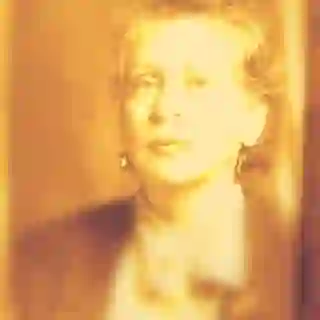
Ilka Tanya Payán
Ilka Tanya Payán started out as an actress in the Spanish-language telenovela Angelica, Mi Vida, and went on to bigger Hollywood roles such as a small part in Scarface and a guest role on the 1980s TV drama Hill Street Blues. Payán, of Dominican ancestry, also worked hard to encourage New York's Latino theater community, founding the Hispanic Organization of Latin Actresses (HOLA). Payán studied law and became an attorney in 1981. Around her time in law school, she acquired HIV from a former lover, though she did not test positive until 1986.
Payán disclosed her status in 1993, prompted by the death of singer Héctor Lavoe. As one of the first Latino celebrities to disclose her status, she rocked the Latino community at a time when many Latinos saw HIV/AIDS as a disease that only affected gay men, sex workers and drug users. Fighting that stereotype became Payán's new mission in life. On Dec. 10, 1993, she was chosen to be the featured speaker at the United Nations panel for World AIDS Day, and Payán was given the Medal of Honor in recognition of her activism by Dominican president Joaquín Balaguer. She appeared on the cover of POZ magazine in August 1995. She worked in the legal department at Gay Men's Health Crisis up until her death on April 6, 1996.
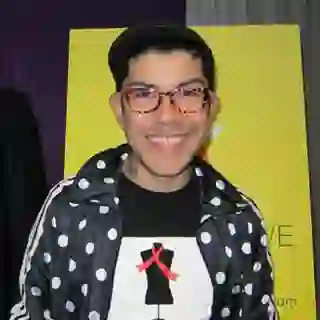
Mondo Guerra
Mondo Guerra is among the breakout stars from the reality competition program Project Runway. A Mexican-American fashion designer and gay man from Denver, he was one of the finalists of the show's eighth season, in 2010. He revealed his status during the 10th challenge, and disclosed that he had kept his status a secret for 10 years. Guerra went on to win the All-Stars edition of the show in 2012.
Since Runway, Mondo has become a prominent HIV/AIDS advocate and activist. Working with pharmaceutical company Merck, Guerra started a campaign called "Project I Design," which encourages people living with HIV to work with their doctors to tailor their individual treatment plans. He unveiled a special one-of-a-kind dress on World AIDS Day 2012 that was inspired by people's messages at the 2012 United States Conference on AIDS. Mondo Guerra continues to design, to live an openly positive life, and to advocate for HIV-positive people.